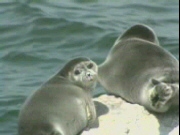Lake Baikal
Russia's freshwater jewel is under threat
 Lake Baikal is large enough to supply the world with fresh water for half a century and is one of the few remaining jewels in the Soviet crown.
Lake Baikal is large enough to supply the world with fresh water for half a century and is one of the few remaining jewels in the Soviet crown.
The only practical way to get around Baikal is by boat, in weather conditions which can alter dramatically from hour to hour. The lake is more hospitable to its 100,000 freshwater seal population. We find a seal sick bay where the weaker animals languish on a rock. A small seal, with too many wrinkles on his neck, looks unwell and underfed. Many are dying from pollution, poaching and entanglement in fishing nets. Baikal's largest island, Olkhon, boasts a fishing industry and plenty of rain. It is also developing a thriving tourist trade. But as heavy industries pump waste into the lake, the greatest human impact on the lake is pollution. The biggest offender is a Cellulose Plant. A local environmental group complains that the lake's waste treatment centre is often closed. As tourism develops in its haphazard way, there is new pressure for legislation to regulate local industry. But in Russia, money speaks louder than law, and the future of the lake depends more upon good luck than good management. (
FULL SYNOPSIS

